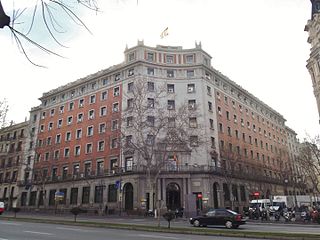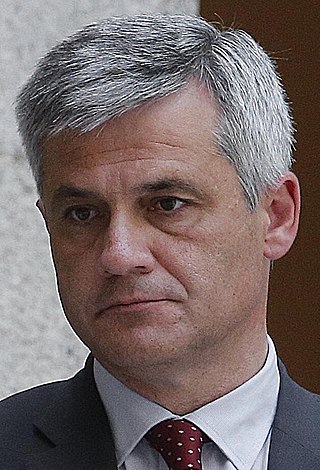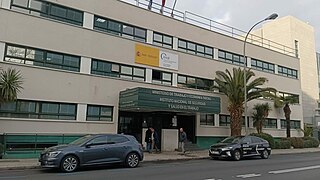
ENAIRE is the air navigation manager in Spain, certified for the provision of en route, approach and aerodrome control services. As a public corporate entity attached to the Spanish Ministry of Public Works, it is responsible for air traffic control, aeronautical information and the communication, navigation and surveillance networks - these are all necessary so that air companies and their aircraft can fly safely and in an organised format within Spanish airspace.

The Ministry of Transport, Mobility and Urban Agenda (MITMA), traditionally known as the Ministry of Development (MFOM), is the department of the Government of Spain responsible for preparing and implementing the government policy on land, air and maritime transport infrastructure and the control, planning and regulation of the transport services on this areas. It is also responsible for guaranteeing access to housing; urban, soil and architecture policies; planning and controlling the postal and telegraph services, directing the services related to astronomy, geodesy, geophysics and mapping, and planning and programing the government investments on infrastructure and services related to this scope. The Ministry's headquarters are in the New Ministries government complex.
The State Meteorological Agency is a state agency of the Government of Spain responsible for providing weather forecast, warnings of hazardous weather and assisting the administrations in such matters. The AEMET is part of the Secretariat of State for Environment of the Ministry for the Ecological Transition and is headquartered in the University City, Madrid. The agency was known as Central Institute of Meteorology from 1887 to 1978 and National Institute of Meteorology from 1978 to 2008 when it adopted its current name.

ADIF is a Spanish state-owned railway infrastructure manager. This state owned company reports to the Ministry of Transport, Mobility and Urban Agenda. ADIF is charged with the management of most of Spain's railway infrastructure, that is the track, signaling and stations. It was formed in 2005 in response to European Union requirements to separate the natural monopoly of infrastructure management from the competitive operations of running train services. It is the legal successor of Renfe, Feve, and GIF.

The Ministry of Health (MISAN) is the department of the Government of Spain responsible for proposing and executing the government policy on health, planning and providing healthcare as well as the exercise of the powers of the General State Administration to assure citizens the right to health protection. The Ministry is headquartered in the Paseo del Prado in Madrid, opposite the Prado Museum.

The Spanish Agency for International Development Cooperation (AECID) is a Spanish autonomous agency responsible for the management of the Government international development cooperation policy.

The Ministry of Science and Innovation (MICINN) is the department of the Government of Spain responsible for developing and implementing the government policy on scientific research, technological development and innovation in all sectors. In particular, MICINN is responsible for the exercise of research, technological development and innovation competencies in space matters, including representation and participation in European Union and International organizations.

The Secretary of State for Defence (SEDEF) is the second-highest-ranking official in the Ministry of Defence of Spain. The SEDEF is a civilian which is appointed by the King with the advice of the Defence Minister. In spite of being the second authority of the Ministry, it is behind the Chief of the Defence Staff as far as military control is concerned.
The Directorate-General of the Police (DGP) is a component of the Spanish Department of the Interior responsible for exercising the direct command of the National Police Corps, the main civil law enforcement agency of Spain. The DGP, integrated in the Secretariat of State for Security, is in charge of organize, direct, coordinate and execute the missions entrusted to the National Police by the provisions in force, in accordance with the guidelines and orders issued by the Minister of the Interior.
The Spanish Agency of Medicines and Medical Devices is a regulatory and autonomous agency of the Government of Spain that acts as the highest sanitary authority in the country in terms of medical safety on medicines, health products, cosmetics and personal care products.

The Spanish Agency for Food Safety and Nutrition (AESAN) is a regulatory agency of the Government of Spain responsible for promoting food safety and for providing guarantees and objective information to consumers and economic agents of the Spanish agrifood industry.

The Secretary of State for Infrastructure, Transport and Housing (SEITV) is a high-ranking official of the Ministry of Development of the Government of Spain. The SEITV is appointed by the King of Spain at the proposal of the Minister of Development.

The Institute of Youth (INJUVE) is an autonomous agency of the Government of Spain responsible for promoting youth associations and collaboration for their advancement; the development and coordination of an information and communication system for youth; the promotion of relations and international cooperation in youth affairs; as well as the cultural promotion of youth and knowledge of other cultural realities.

The Ministry of Social Affairs (MAS), since 2020 known as Ministry of Social Rights and 2030 Agenda, is a department of the Government of Spain responsible for the government policies on social services, family, minors protection, disability and prevention of youth crime, adoptions and foster care and the promotion of cultural communication and youth association. Likewise, the department is responsible for the government policies on animal welfare and UN Sustainable Development Goals.
The Directorate-General of the Civil Guard (DGGC) is a component of the Spanish Department of the Interior responsible for exercising the direct command of the Civil Guard law enforcement agency. The DGGC, integrated in the Secretariat of State for Security, is in charge of organize, direct, coordinate and execute the missions entrusted to the Civil Guard by the provisions in force, in accordance with the guidelines and orders issued by the Ministers of the Interior and of Defense, within the scope of their respective powers.

The Ministry of Inclusion, Social Security and Migration is a department of the government of Spain responsible for planning and carrying out the government policy on Social Security, foreigners, immigration and emigration.

The National Institute for Safety and Health at Work is an autonomous agency of the Government of Spain. The INSST is considered a technical-scientific agency entrusted with the task of analyze and research on safety and health conditions at work, as well of promoting and supporting the improvement of them, in order to achieve a decrease in occupational hazards, work accidents and occupational diseases.

The Food Information and Control Agency is the Spanish Department of Agriculture, Fisheries and Food autonomous agency responsible for managing the information and control systems of the olericulture, dairy and other markets that the Ministry determines; the control of compliance with the Food Chain Improvement Act of 2013 and the official control of Protected Designations of Origin and Geographical Indications whose territorial scope extends to more than one autonomous community, before the commercialization.
The Agencia Espacial Española is an agency of the Spanish government responsible for the Spanish space program. The agency was officially announced on 27 May 2021 and it became operational in 20 April 2023.












